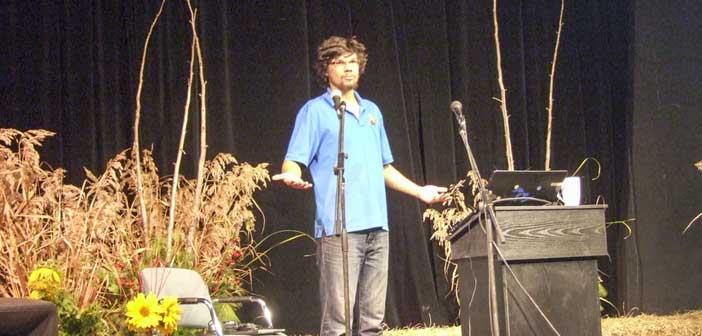MANITOWANING—The annual 6 Foot Festival’s fifth anniversary edition focussed on “Transformations” by providing an exhibition of the most intriguing projects since the festival began and an update on where they are today.
Permaculture plays a central role in today’s 6 Foot Festival and the discussions and workshops throughout the three-day event centred on exploring strategies for “for integrating permaculture design principals on a community-wide, organization wide or regional level.”
“We also explored the relationship between permaculture and indigenous knowledge,” said Debajehmujig Storytellers executive director/artistic producer Ron Berti. “We will be placing a particular focus on the principles of or teachings that each of those approaches uphold.”
Two local speakers, indigenous plant-based medicine teacher Joe Pitawanakwat, whose book ‘The Creator’s Garden: The Legitimacy of Plant Based Medicine and the Doctrine of Signatures’ is eagerly awaited, and Justin Tilson, the Island permaculture practitioner whose Honora Bay based operation has become a Northern Ontario mecca for aficionados of the approach, that leads to more integrated and sustainable lifestyle for the future.
Permaculture is defined as “a branch of ecological design, ecological engineering, environmental design, construction and integrated water resources management that develops sustainable architecture, regenerative and self-maintained habitat and agricultural systems modeled from natural ecosystems,” a decidedly Zen-like approach to life balance and living substainably in the post-modernity world.
Mr. Pitawanakwat’s presentation was designed to “legitimize” plant-based medicines utilizing three legs of ‘proof.’ He described these proofs as being traditional-cultural proof, scientific proof and the ancient doctrine of signatures.
He described the first as “by far the most simple. This is how the ancients described medicine,” he said. “This is where people like my grandmother would walk by a plant and say ‘that is kidney medicine’ or ‘that is lung medicine’ and ‘that is heart medicine.’”
Mr. Pitawanakwat described his own skepticism at accepting traditional medicines on the word of the elders, although he sheepishly admitted feeling some remorse at doubting his grandmother. “There was too much mysticism around plant-based medicine,” he said, describing his view of the field as ‘folk medicine’ and ‘home remedies.’
Still, he found that he was driven to get to the bottom of the science behind the traditional claims of efficacy in treating diseases with the traditional plant-based medicines. “I was able to prove what the ancients have been practicing forever, using modern empirical science,” he said. Although he was not a stellar student in his early years of study, he soon found himself consumed with the project and discovered a remarkable facility for the subject. What he found in the science inevitably and invariably backed his grandmother’s wisdom.
The third ‘proof,’ the Doctrine of Signatures,’ is somewhat more esoteric, or perhaps even problematic, as Mr. Pitawanakwat admitted a healthy skepticism of the theory behind much of the ‘scientific’ inquiry leading back into antiquity. Mr. Pitawanakwat explained that the doctrine interprets each plant’s medicinal use by examining that plant’s features that are indicative of its medical application.
Mr. Pitawanakwat started out his discussion by examining some common foods and how those foods seem to be specifically designed to nourish the body part that they resemble. He went on to apply the concept to medicinal plants and herbs and harnessed modern tools to find the comparisons, even down to microscopic images and features that can only be examined through the use of electron microscopes.
Mr. Tilson described many of the projects that are taking place on his and other properties across Manitoulin and facilitated an open discussion on the subject of permaculture.
Sébastien Bacharach and Bonita Ford, members of the Permaculture Institute of Eastern Ontario and Transition Perth, joined the 6 Foot Festival discussions and led workshops for the Debaj crew investigating the applications of the permaculture model to the creative structure and operation of the theatre and artistic group.
“This Manitoulin is a wonderful place,” said Ms. Ford, who noted that she was very impressed with the works taking place across the Island and the role that permaculture concepts are playing in those projects. “We have really enjoyed our time here.”
The 6 Foot Festival is playing a central role on Manitoulin in helping to educate and inform people about permaculture and its applications to making our everyday lives more sustainable and enriching experiences.




